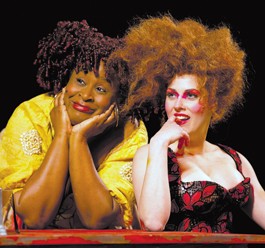Beyond the trivia that “Shakespeare” and “summer” both begin with the 19th letter of the alphabet, there is no logical reason why such a serious surge of Shakespearean shows surface during the season of sizzle and swelter. As our local Shakespeare festivals prepare to dazzle us with Elizabethan splendor—beginning this weekend with Sebastopol Shakespeare’s new outdoor staging of The Complete Works of William Shakespeare (Abridged) —other notable Bard-believing institutions are already under way. Two weeks ago, the Tony-award-winning Oregon Shakespeare Festival—just a quick five-and-a-half-hour drive up I-5—opened its beautiful outdoor Elizabethan Theatre, adding three new shows to the six already running in its two indoor theaters.
Oops. Make that one indoor theater.
A few days ago, after a large crack was discovered along a major support beam inside the busy Angus T. Bowmer Theatre, the four shows running there in repertory—including a sensational production of Shakespeare’s hard-to-do Measure for Measure—were temporarily halted. With repairs expected to take two months or so, an enormous tent is being constructed in nearby Lithia Park where the shows (Measure for Measure, The Imaginary Invalid, To Kill a Mockingbird and August: Osage County) will be staged, in somewhat less ornate fashion, until the fractured theater reopens.
Meanwhile, there are still those three new shows to be discussed and analyzed. As usual, with OSF now in its 76th year, there is much public conversation in Ashland about the artistic direction the festival takes with its shows. Never has there been a town more interested in the way Shakespeare, or any other classic for that matter, is presented to the public. There are few restaurants or bars in town where one is unlikely to overhear people animatedly using words like “iambic pentameter,” “historical accuracy” and “authorial intention.”
Of course, this year, the phrase “daddy issues” has also become a common refrain. Either coincidentally or by design, all three of the new summer-run shows examine transitional moments at which young men—a pair of princes and a princely pirate—grow up and leave their boyhood behind as they take tentative steps toward adulthood.
This is the overt theme of Henry IV, Part Two, the smartly structured history in which Henry V, whom Shakespeare later gave his own play, continues his evolution from hard-partying playboy to no-nonsense king of England. Directed by Lisa Peterson as a modern-dress serio-comedy and staged on a spare set of gleaming metal scaffolding, this entertaining production takes its share of chances. Riffing on Shakespeare’s odd inclusion of a narrator named “Rumor,” along with the playwright’s colorful suggestion that Rumor appear in a costume painted with tongues, Peterson uses that idea for all its worth. The director invents ways for Rumor to reappear again and again—in the courts where Prince Henry’s father desperately holds on to power as rebels amass to take the crown, and in the taverns and brothels where the prince has served a strange apprentice under the scruffy, alcoholic knight Sir John Falstaff.
Falstaff himself can barely wait for his young protégé to take the throne, assuming it will mean riches and easy life for himself and his motley band of outlaws. Peterson’s clear staging powers through a talkative first act (some unfortunate souls ended up leaving at intermission, not suspecting how good the play was about to get), and hits emotional pay dirt in the second portion of the show.
As written by Shakespeare, it’s a series of escalating scenes which build with emotional power as young Henry makes a trio of heartbreaking decisions, ultimately choosing sober maturity over reckless youth—facing up to his kingly duties even as he turns his back on his friends.
In The Pirates of Penzance, the beloved Gilbert and Sullivan musical (a first on the Elizabethan stage), a similar struggle takes place. Directed with plenty of inventive spectacle by artistic director Bill Rauch, the supremely silly story follows young Frederic, an apprentice for years to a band of orphan-sympathizing pirates. He has reached the age of 21, when his indentures to the pirates are contracted to end. A decent fellow, Frederic marks his birthday by announcing his determination to leave the pirates once and for all, and to devote himself to the task of ridding the world of piracy.
Rauch keeps the story relevant and the audience off-balance by including a number of musical “grace notes,” with snippets of recognizable swing, gospel, rock and disco tunes dropped into the score to emphasize the underlying theme in various scenes. It’s big, bright, flawlessly executed, and, though essentially pointless, it’s thoroughly delightful.
As is Love’s Labour’s Lost.
Directed by Shana Cooper, Labour’s has always been regarded as one of Shakespeare’s least successful comedies. It also holds the distinction of being his only romance that does not end with a wedding.
The story involves Ferdinand, the king of Navarre, who’s decided to turn his court into a “boys only” palace, forswearing alcohol, women, fancy food (and blow-up sex dolls!) in order to devote himself to study for the next three years. No sooner have Ferdinand and his friends fenced themselves inside the castle than up pops the princess of France and her gorgeous gal pals, offended to find themselves forced to stay in tents out on the lawn. Right on cue, each man of the court falls in love with one of the ladies, and instead of rescinding the royal order against such dalliances, they launch a plan to court the women by disguising themselves as visiting Russians.
It’s silly stuff—too silly for most people. But what makes this production work is Cooper’s emphasis on the young men as young men. Still inclined to food fights (another first on the Elizabethan stage, I think) and untrusting of anyone over 30, these fickle fellows are clearly in for it. In this lovely and lyrical staging, the lessons they learn as they fall in love—and face a few hard facts—become unexpectedly poignant and genuinely moving, no small feat for this oft-overlooked trifle.
A full Oregon Shakespeare Festival lineup is at www.osfashland.org.








